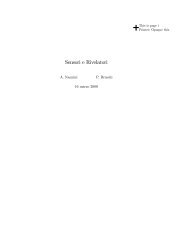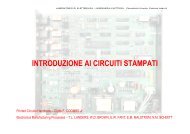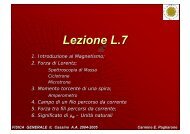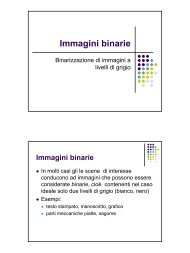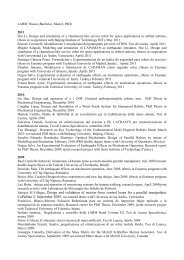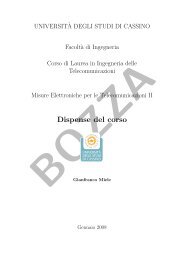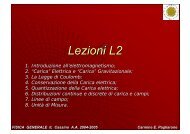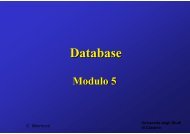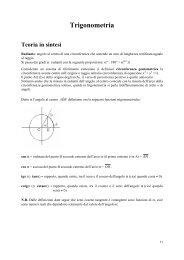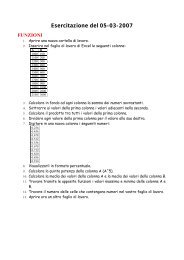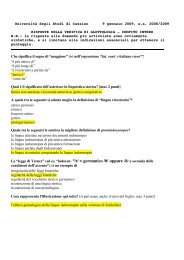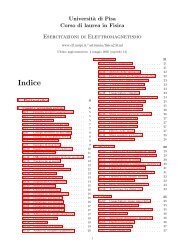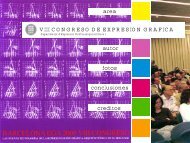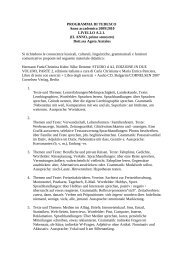Qui - Università degli Studi di Cassino
Qui - Università degli Studi di Cassino
Qui - Università degli Studi di Cassino
You also want an ePaper? Increase the reach of your titles
YUMPU automatically turns print PDFs into web optimized ePapers that Google loves.
4. Il consonantismo del gotico: origine indoeuropea delle consonanti gotiche.<br />
got. [p]<br />
got. [t]<br />
got. [k]<br />
got. [b]<br />
< gmc. *[p]<br />
< ie. *b<br />
< gmc. *[t]<br />
< ie. *d<br />
*dhewb-o-s ‘profondo’ > gmc. * ðeupaz > got. <strong>di</strong>ups, ant.ingl. <strong>di</strong>epe ingl. deep, aat. tiof<br />
ted. tief; cfr lituano dubùs ‘profondo’, gallico *dubno-, dumno- ‘mondo da basso;<br />
profondo, tenebroso’ in Dumnorīx nome proprio<br />
*s-lēb- > germ. *slēpanan > got. slepan (cfr. got. sleps ‘sonno’), aat. slāfan ted.<br />
schlafen ‘dormire’, ags. slæpan ingl. sleep; cfr. lat. labō ‘vacillare, star per cadere’<br />
< ie. *p preceduto da fricativa sorda (<strong>di</strong> fatto, presente solo nel gruppo *sp)<br />
*spīu̯- > gmc. *spīwanan > got. speiwan, ant. ingl. spíwan ingl. spew ‘vomitare,<br />
espellere’, aat. spīwan ted. speien ‘vomitare’; cfr. lat. spuō ‘sputare’, spūtum ‘sputo’ gr.<br />
ptúō ‘sputare’<br />
*k w o-d ‘cosa?’ > gmc. *xwat > got. ƕa (–t cade forse a causa dell’uso in protonia),<br />
ant.nord. huat, ant.ingl. hwæt ingl. what, aat. hwaz ted. was; cfr. lat. quod<br />
*ed- > gmc. *et- > got. itan ‘mangiare’, cfr. ant.ingl. etan ingl. eat, aat. ezzan ted.<br />
essen; cfr. lat. edō, gr. édomai<br />
*woid-a ‘io so’ > gmc. *wait[a] > got. wait aat. waiʒ ted. weiss; cfr gr. oîda, avest.<br />
vaēdā, ant.ind. vḗda<br />
< ie. *t preceduto da fricativa sorda (ie. o germanica: *st, *ft, *xt)<br />
*ghosti-s ‘straniero’ > gmc. *γasti-z > got. gasts ‘ospite’, ant.isl. gestr ([e] a causa <strong>di</strong><br />
metafonia da –i), aat. gast ted. Gast ‘ospite’; cfr. lat. hostis ‘nemico’<br />
*kap-to-s > gmc. *xaftaz > got. hafts ‘legato, sposato’, aat. haft ted. haft; lat. captus<br />
‘preso, catturato’<br />
*dhug(h)əәtér > gmc. *đuxtēr > got. dauhtar ‘figlia’, cfr. ingl. daughter ted. Tochter;<br />
cfr. gr. thugátēr, scr. duhitár-<br />
< gmc. *[k]<br />
< ie. *g, *ĝ<br />
*ăĝro-s ‘campo’ > gmc. *akra-z > got. akrs, ant.nord. akr, ant.ingl. æcer, aat. ackar<br />
ted. Acker: cfr. lat. ager, gr. agrós ‘campo, ant.ind. ájraḥ<br />
*aug- > gmc. *auk- > got. aukan, lat. augeō, gr. auksánō ‘aumento, accresco’<br />
*i̯ugó-m > gmc. *juka-n > got. juk ‘giogo’, ant.ingl. geoc ‘id.’ ingl. yoke ‘id.’, aat. joh<br />
‘id.’ td. Joch ‘id.; cfr. scr. yugá-, gr. zugón, lat. iugum ‘id.’<br />
< ie. *k preceduto da fricativa sorda (ie. o germanica, ma <strong>di</strong> fatto solo *sk)<br />
*p(e)isk-o- > gmc. *fiska-z ‘pesce’ > got. fisks, ant.nord. fiskr, ant.ingl. fisċ ingl. fish;<br />
cfr. lat. piscis<br />
10



